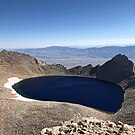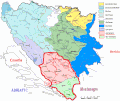The Lakes Portal
A portal dedicated to Lakes
Introduction

A lake is an often naturally occurring, relatively large and fixed body of water on or near the Earth's surface. It is localized in a basin or interconnected basins surrounded by dry land. Lakes lie completely on land and are separate from the ocean, although they may be connected with the ocean by rivers. Lakes, as with other bodies of water, are part of the water cycle, the processes by which water moves around the Earth. Most lakes are fresh water and account for almost all the world's surface freshwater, but some are salt lakes with salinities even higher than that of seawater. Lakes vary significantly in surface area and volume of water.
Lakes are typically larger and deeper than ponds, which are also water-filled basins on land, although there are no official definitions or scientific criteria distinguishing the two. Lakes are also distinct from lagoons, which are generally shallow tidal pools dammed by sandbars or other material at coastal regions of oceans or large lakes. Most lakes are fed by springs, and both fed and drained by creeks and rivers, but some lakes are endorheic without any outflow, while volcanic lakes are filled directly by precipitation runoffs and do not have any inflow streams.
Natural lakes are generally found in mountainous areas (i.e. alpine lakes), dormant volcanic craters, rift zones and areas with ongoing glaciation. Other lakes are found in depressed landforms or along the courses of mature rivers, where a river channel has widened over a basin formed by eroded floodplains and wetlands. Some lakes are found in caverns underground. Some parts of the world have many lakes formed by the chaotic drainage patterns left over from the last ice age. All lakes are temporary over long periods of time, as they will slowly fill in with sediments or spill out of the basin containing them. (Full article...)
Selected article -
Lake Maracaibo (Spanish: Lago de Maracaibo) is located in northwestern Venezuela, between the states of Zulia, Trujillo, and Mérida. While Maracaibo is commonly referred to as a lake, its current hydrological characteristics may better classify it as estuary and/or semi-enclosed bay connected to the Gulf of Venezuela. With a surface area of 13,512 km2 (5,217 sq mi), if counted as a lake it would be the largest in South America, ahead of Lake Titicaca, as well as one of the oldest lakes on Earth, having formed 36 million years ago in the Andes Mountains.
The lake is connected to the Gulf of Venezuela to the north by a narrow spit. It is fed by numerous rivers, the biggest being the Catatumbo River. The fault in the northern section has collapsed and is rich in oil and gas resources. It is Venezuela's main oil producing area and an important fishing and agricultural producing area. Eutrophication caused by oil pollution is a major environmental problem facing the lagoon. The area around the lagoon is inhabited by a quarter of the country's population and is also the place with the most frequent lightning on Earth. The famous Catatumbo lightning can illuminate nighttime navigation. (Full article...)
General topics
| Lake zones |
|---|
| Lake stratification |
| Lake types |
| See also |
Need assistance?

Do you have a question about lakes that you can't find the answer to? Consider asking it at the Wikipedia reference desk.
Categories
More articles
Associated Wikimedia
The following Wikimedia Foundation sister projects provide more on this subject:
-
Commons
Free media repository -
Wikibooks
Free textbooks and manuals -
Wikidata
Free knowledge base -
Wikinews
Free-content news -
Wikiquote
Collection of quotations -
Wikisource
Free-content library -
Wikiversity
Free learning tools -
Wiktionary
Dictionary and thesaurus
External media

- World Lake Database. International Lake Environment Committee Foundation. – provides a searchable database
- Global Lakes and Wetlands Database. World Wide Fund for Nature. – available for free download


































































